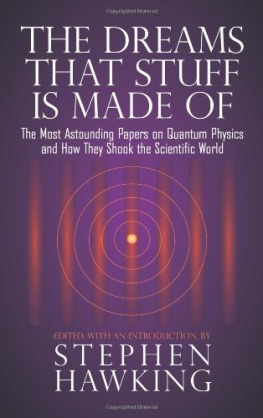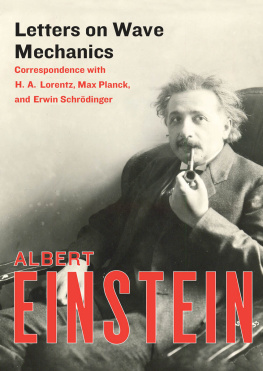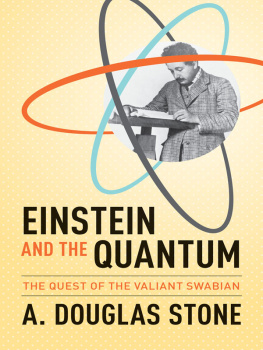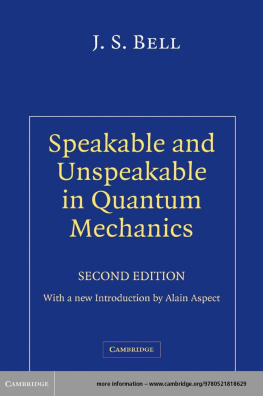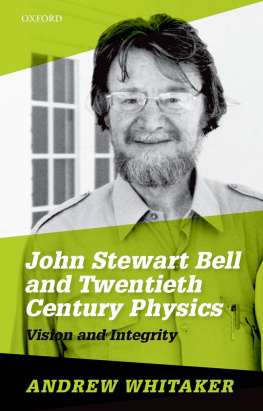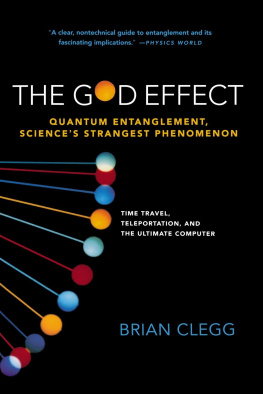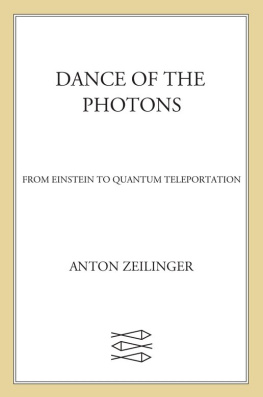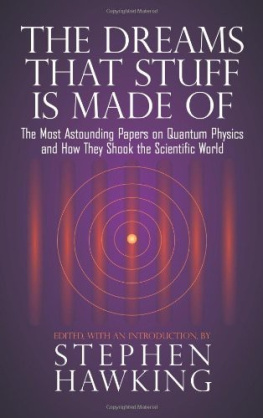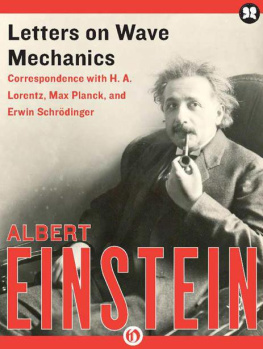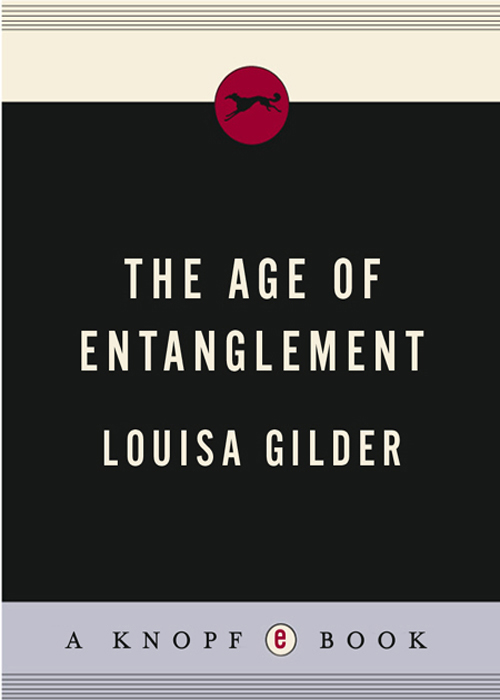
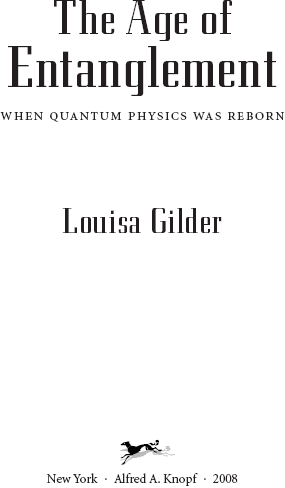
CONTENTS
For my father
If people do not believe that mathematics is simple, it is only because they do not realize how complicated life is.
John von Neumann
LIST OF ILLUSTRATIONS
ALL BY THE AUTHOR UNLESS NOTED
A NOTE TO THE READER
Werner Heisenberg, the pioneer who first laid down the laws of the fundamental behavior of matter and light, was an old man when he sat down to write about his life. The book he wrote is not an autobiography of the man but an autobiography of his intellect, entirely a series of reconstructed conversations. His two most famous papers are solo affairsone introducing quantum mechanics (the laws of the fundamental behavior of matter and light) and the other on the uncertainty principle (which declares that at any given time, the more specific a particles position, the more vague its speed and direction, and vice versa). But the roots of each solitary paper reach deep into months of heated and careful conversation with most of the great names of quantum physics. Science rests on experiments, wrote Heisenberg, but science is rooted in conversations.
Nothing could be further from the impression physics textbooks give to students. There, physics seems to be a perfect sculpture sitting in a vacuum-sealed case, as if brains, only tenuously connected to bodies, had given birth to insights fully formed. These Athena-like theories and Zeus-like theorists seem shiny, glassy, smoothsometimes, if the light is right, you can see through them into the mysteries and beauties of the physical universe; but there is hardly a trace of humanity, or any sense of questions still to be answered.
Physics, in actuality, is a never-ending search made by human beings. Gods and angels do not come bearing perfectly formed theories to disembodied prophets who instantly write textbooks. The schoolbook simplifications obscure the crooked, strange, and fascinating paths that stretch out from each idea, not only back into the past but also onward into the future. While we aspire to universality and perfection, we are lying if we write as if we have achieved it.
Conversations are essential to science. But the off-the-cuff nature of conversation poses a difficulty. It is rare, even in these digital times, to have a complete transcript of every word spoken between two people on a given day, even if that conversation someday leads to a new understanding of the world. The result is that history books rarely have much of the to-and-fro of human interaction. Heisenbergs statement suggests that something is therefore lost.
When I first started poring through the memoirs and biographies of the quantum physicists of the twentieth century, I felt as if I were watching a moviethe cast of characters was so vivid and the plot twists so unexpected. While the strength of science is its ability to slough off the contingencies of history and reach toward pure knowledge, this knowledge is built, one puzzle piece at a time, by people living their lives in specific times and places with specific passions. Science unfolds in some directions rather than in others because of circumstances. Characters (not disembodied brains) and plot twists (not the relentless forward march of truth) almost guarantee that this is true.
As Tom Wolfe wrote at the beginning of The Electric Kool-Aid Acid Test: I have tried not only to tell what the Pranksters did but to re-create the mental atmosphere or subjective reality of it. I dont think their adventure can be understood without that. Wolfe was recounting a very different kind of mental history, but his point, I find, is even more true about the portentous history of science and intellect that unfolded as the age of entanglement.
This is a book of conversations, a book about how the give-and-take between physicists repeatedly changed the direction in which quantum physics developed, just as conversations, subtly or dramatically, change the world we live in and experience every day. All the conversations in this book occurred in some form, on the date specified in the text, and I have fully documented the substance of every one. (The endnotes detailing the source of each quote speak for themselves.) Most are composed of direct quotes (or close paraphrases) from the trove of letters, papers, and memoirs that these physicists left behind. When occasional connective tissue (e.g., Nice to see you, or I agree) was necessary, I tried to keep it both innocuous and also sensitive to the character, beliefs, and history of the people involved. A glance at the notes will separate quote from filler.
Here is a sample from the text, from a conversation that took place in the summer of 1923 on a streetcar in Copenhagen between two of the founders of the quantum theory, Albert Einstein and Niels Bohr, and its first great teacher, Arnold Sommerfeld.
Its good to see you doing so well, says Einstein.
Bohr shakes his head, smiling: My life from the scientific point of view passes off in periods of over-happiness and despairas I know that both of you understandof feeling vigorous and overworked, of starting papers and not getting them publishedhis face is earnestbecause all the time I am gradually changing my views about this terrible riddle which the quantum theory is.
I know, says Sommerfeld, I know.
Einsteins eyes almost close; he is nodding. That is a wall before which I am stopped. The difficulties are terrible. His eyes open. The theory of relativity was only a sort of respite which I gave myself during my struggles with the quanta.
We know that the conversation (of which this interchange represents a tiny piece) happened, because Bohr mentioned it in an interview late in his life with his son and one of his closest colleagues. The content of the conversation is easy to gather from a look at what the three men were working on and writing friends about around the same time. Here Bohr, in the interview, describes that day in 1923:
Sommerfeld was not impractical, not quite impractical; but Einstein was not more practical than I and, when he came to Copenhagen, I naturally fetched him from the railway station.
We took the streetcar from the station and talked so animatedly about things that we went much too far past our destination. So we got off and went back. Thereafter we again went too far, I cant remember how many stops, but we rode back and forth in the streetcar because Einstein was really interested at that time; we dont know whether his interest was more or less skepticalbut in any case we went back and forth many times in the streetcar and what people thought of us, that is something else.
Here is the first quote on which this particular short section of the conversation is based. It comes from a letter Bohr wrote to a British colleague in August of 1918:
I know that you understandhow my life from the scientific point of view passes off in periods of over-happiness and despair, of feeling vigorous and overworked, of starting papers and not getting them published, because all the time I am gradually changing my views about this terrible riddle which the quantum theory is.
How can a passage written five years earlier be relevant? Some things had changed for Bohr in the intervening years, but what he touches on in the letter had remained the samethe excitement, dejection, and overwork (during this whole period he was building his institute of physics in Copenhagen); the long, arduous papers only partially published; and, most of all, his struggle to understand the quantum theory, which until Heisenbergs breakthrough in 1925 stood on shifting sand.
Next page

